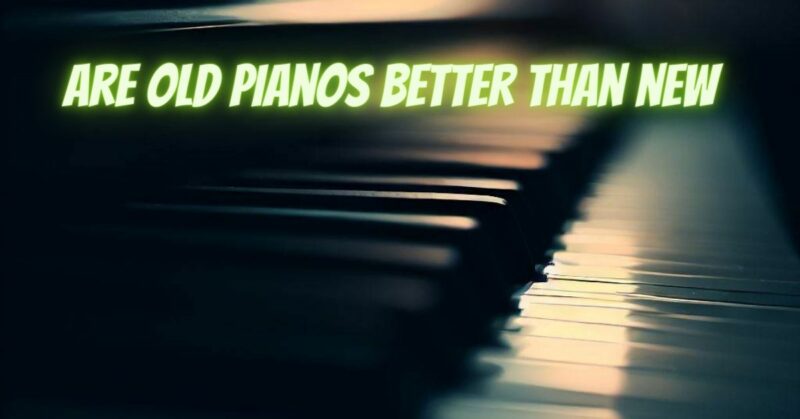When considering the purchase of a piano, you may encounter a common belief that old pianos are inherently better than new ones. While older pianos may possess a certain charm and character, it is essential to dispel the myth that age alone determines the quality or superiority of a piano. In this article, we will explore the factors involved in assessing the quality of both old and new pianos, enabling you to make an informed decision based on your preferences and musical needs.
- Sound Quality and Tone: The sound quality and tone of a piano are influenced by various factors, including the quality of materials, craftsmanship, and maintenance. While older pianos may have developed a distinct tonal character over time, it does not necessarily mean that they are superior to new pianos. New pianos benefit from advancements in design, technology, and manufacturing techniques, which can result in improved sound quality, tonal range, and overall performance.
- Playability and Touch: The playability and touch of a piano are crucial considerations for pianists. Older pianos may exhibit wear and tear on the action mechanism, affecting the responsiveness and consistency of the keys. On the other hand, new pianos are often regulated and adjusted to precise standards, ensuring optimal touch and playability. Newer pianos may also have more consistent key weighting and action mechanisms, offering a smoother and more controlled playing experience.
- Durability and Reliability: Older pianos may require more frequent maintenance and repairs due to their age and potential wear. New pianos, particularly those from reputable manufacturers, are typically built with durable materials and undergo rigorous quality control processes. This ensures greater reliability and longevity, reducing the need for immediate repairs or extensive maintenance.
- Technological Advancements: New pianos often incorporate technological advancements that enhance their functionality and versatility. Features such as recording capabilities, digital interfaces, and connectivity options are more commonly found in newer models. These technological advancements can offer additional benefits and conveniences for musicians, allowing for creativity and exploration of new possibilities.
- Personal Preference and Musical Needs: Ultimately, the choice between an old or new piano depends on personal preference and specific musical needs. Some individuals may appreciate the historical significance and unique characteristics of an older piano, while others may prefer the reliability, playability, and advanced features of a new piano. It is important to consider your musical goals, playing style, and budget when making a decision.
Conclusion:
The belief that old pianos are inherently better than new pianos is a misconception. While older pianos may possess a unique character and tonal qualities, new pianos often offer improved sound, playability, durability, and technological advancements. The decision between an old or new piano should be based on careful consideration of sound quality, playability, durability, technological features, personal preference, and budget. It is recommended to play and compare various pianos, both old and new, to determine which instrument best suits your musical aspirations and requirements.

